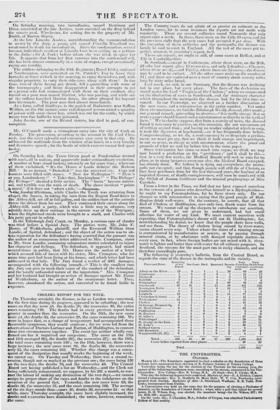7 On Saturday last, the Town Green pond at Dunfermline
teemed ( with toads, all in motion, and apparently under extraordinary excitation. . A number of boys stood looking intensely on for some time ; when one , of them exclaimed, " It's the House o' Lords &bathe the Reform I Bill." In an instant, " Demolish !" was the universal cry. Caps and 1 bonnets were filled with stones. " Now for Wellington !" " Here 's at you, Londonderry !" " Take that, Buckingham !" " The Bishops ! the Bishops !" shouted a little urchin. The " hurra" became univer- sal, and terrible was the work of death. The above incident "points k..„akmoral," if it does not "adorn a tale."—&i,es2ifea- Ne4,1n_Suntlay-aftertfoon, while Charles the Tenth was returning from chapel, the horses, in taking the turn from the Regent Road down to
. the Abbey-hill, set off at full gallop, and the sudden start of the animals threw the driver from his seat. They continued their career along the Abbey-hill, until a party, which was a little way in advance, very adroitly drew up their carriage in the narrow way of the Watergate; when the frightened steeds were brought to a stand, and Charles with his party got out in safety.
- In the Edinburgh Jury Court, on Monday, a curious case of slander %vas tried before a Special Jury. The parties were, Mr. John F. Horne, of Wedderburn plaintiff, and the Reverend William Stow idundie, of Spittal, defendant; and the object of the action was to ob- tain reparation for the defendant's having asserted that the pursuer was the author of an anonymous letter addressed to Mrs. Crompton, sister to Mr. Stow Lundie containing calumnious matter calculated to injure her character and feelings. The defendant, it appeared, had stated several times in public that Mr. Home was the author of a letter which accused him of incest with his sister, Mrs. Crompton, who for some time past had been living at his house, amid which letter had been addressed to that lady. The Jury found a verdict of 500/. damages, accompanied with the following remark—" This is the smallest sum the Jury can give to mark their sense of the conduct of the defendant, and the totally unfounded nature of the imputation." Mrs. Crompton and her husband had brought an action of damages against Mr. Home a Wedderburn, as the author of the anonymous letter. They, however, abandoned the action, and consented to be found liable in
'expenses.


























 Previous page
Previous page